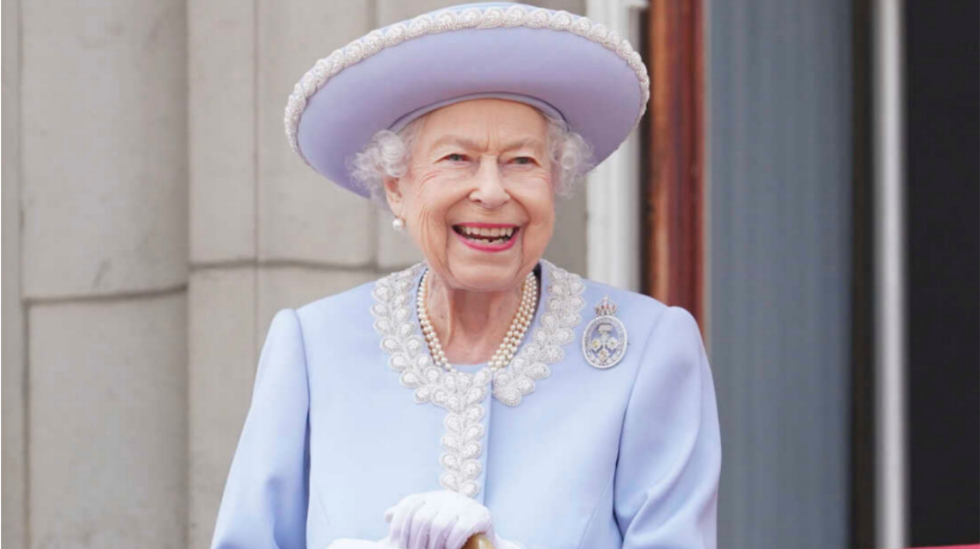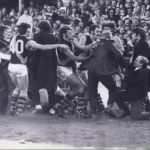Queen Elizabeth II greeting the public at her platinum jubilee celebrations. Photo: AP.
One platinum anniversary jubilee and half a millennium (that is 570 years) ago, a boy was born. His name was Richard. Thirty-two years later Richard III was dead. He was the last king to die in battle, and the first and last, we can say confidently, to have his bludgeoned skeleton found buried underneath a car park.
The short, violent, labyrinthine life and lineage of Richard III came to mind as the universe celebrated the glorious reign of Her Majesty Queen Elizabeth and her 70 years on the British throne. Richard III, and all his contemporaries could only have dreamed of even living to the age of 70, never mind being king or queen that long.
In terms of stability and longevity, the world will never see, we can say with a degree of certainty, the like again. And over the past few days, crowds in their thousands upon thousands have taken to the streets of England to celebrate their Queen, for who knows what good reason. Possibly that she represents, a) all that is good in being British, b) all that is good in being a person, c) all that is good in an institution into which she born and has never left, or d) all that is good in maintaining a power that dares not speak its name.
That name would be privilege.
It can’t be denied that 70 years occupying the seat at the head of the table is the epitome of stability, and it’s been a benign presence, at least on the surface. It also can’t be denied that when the Queen speaks of her duty to her people, she truly means it to the core of her being (the alternative would be truly, staggeringly awful).
It also appears true that many, many people are overjoyed at her presence, indeed rejoice in her being among them. It’s a kind of perverse ownership whereby the owner has no authority, but feels as one with the product.
At its height a century ago, the British Empire held sway over a quarter of the world, both in population and land mass. This, of course, led to an economic dominance unequalled in history, and at the head of all of this was the royal family.
At the weekend, “The Observer” in England ran extracts from commentators through the decades of her reign. Its fashion editor Alison Settle in 1952 wrote: “It is not only to the new Queen and her mother that the hearts of the nation have gone out, but also to Queen Mary, to whom her granddaughter owes so much of her training.
PLEASE HELP US CONTINUE TO THRIVE BY BECOMING AN OFFICIAL FOOTYOLOGY PATRON. JUST CLICK THIS LINK.
“It was she who taught her granddaughters at an early age the stance which fights fatigue, the art of relaxing between one duty and another, and the fact that even if uninterested in what was being told them, the more they learned to memorise the words said to them, the greater would be their air of interest.
“It is perfectly correct for Princess Margaret to experiment with styles, but in the Queen, surprise was an undesired quality. They are figureheads before they are human beings, a hard theory for a young creature to shoulder as a light task, but one with the new Queen has long accepted.”
To be born into royalty meant a duty to that even if you had no interest at all in your people, you had to learn the lines that gave you an appearance of an interest to them. Ah, the costs of having to live in a palace. The costs of having to fly around the world so that your dominions could drool in your shadow as you but passed them by.
The Britishness extolled by one and all these past days has a surface sheen and a rather more prosaic and darker pattern to it. The family now occupying Buckingham Palace and Windsor and Balmoral, was formerly known as the German House of Saxe-Coburg and Gotha; it changed its name in 1917 to Windsor to avoid anti-German sentiment.
There was a war going on, after all, which wasn’t usual down the centuries among the nobility fighting for turf and riches. But this one was big, a world war, in fact. It ushered in the age of industrial slaughter on the battlefield, and was the watershed that led to even greater slaughter with WWII and shaped most of the century. Such were the deep lines through the royal houses of Europe that there were even Nazi sympathisers among them.
But that was then and this is now. Time moves on. The clock is winding down on Elizabeth’s reign. It is also winding down on the prominence royalty plays in society. And that’s a good thing. For it follows if one is queen or king to another, then the other must be cast lower in society. Who would think that or want that?
As to Richard III, a couple of centuries down the track, his life at least gave William Shakespeare the subject of a play, and from that the Bard gave lines to world: “A horse! A horse! My kingdom for a horse!”
It did poor Richard no good.











